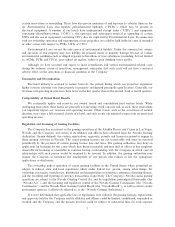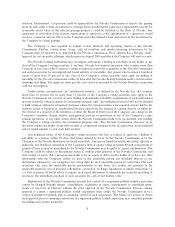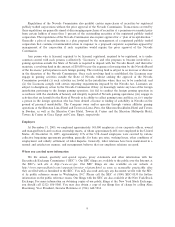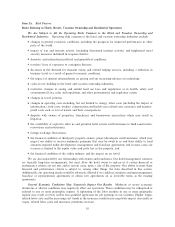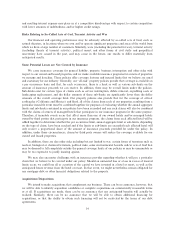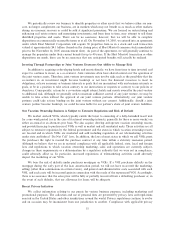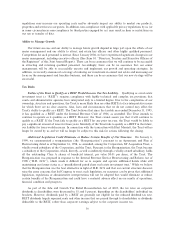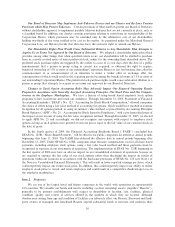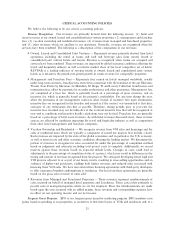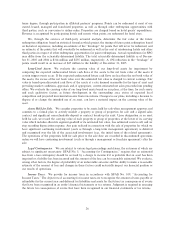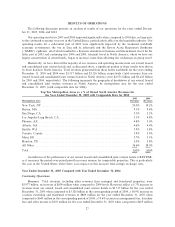Starwood 2005 Annual Report Download - page 21
Download and view the complete annual report
Please find page 21 of the 2005 Starwood annual report below. You can navigate through the pages in the report by either clicking on the pages listed below, or by using the keyword search tool below to find specific information within the annual report.We undertake global tax planning in the normal course of business. These activities may be subject to
review by tax authorities. As a result of the review process, uncertainties exist and it is possible that some
matters could be resolved adversely to us. In connection with the transaction with Host Marriott, the Trust
will no longer be owned by us and we will no longer be subject to this risk on an ongoing basis.
Evolving government regulation could impose taxes or other burdens on our business. We rely upon
generally available interpretations of tax laws and other types of laws and regulations in the countries and
locales in which we operate. We cannot be sure that these interpretations are accurate or that the responsible
taxing or other governmental authority is in agreement with our views. The imposition of additional taxes or
causing us to change the way we conduct our business could cause us to have to pay taxes that we currently do
not collect or pay or increase the costs of our services or increase our costs of operations.
Our current business practice with our internet reservation channels is that the intermediary collects hotel
occupancy tax from its customer based on the price that the intermediary paid us for the hotel room. We then
remit these taxes to the various tax authorities. Several jurisdictions have stated that they may take the
position that the tax is also applicable to the intermediaries' gross proÑt on these hotel transactions. If
jurisdictions take this position, they should seek the additional tax payments from the intermediary; however,
it is possible that they may seek to collect the additional tax payment from us and we would not be able to
collect these taxes from the customers. To the extent that any tax authority succeeds in asserting that the hotel
occupancy tax applies to the gross proÑt on these transactions, we believe that any additional tax would be the
responsibility of the intermediary. However, it is possible that we might have additional tax exposure. In such
event, such actions could have a material adverse eÅect on our business, results of operations and Ñnancial
condition.
Risks Relating to Ownership of Our Shares
No Person or Group May Own More Than 8% of Our Shares. Our governing documents provide
(subject to certain exceptions) that no one person or group may own or be deemed to own more than 8% of
our outstanding stock or Shares of beneÑcial interest, whether measured by vote, value or number of Shares.
There is an exception for shareholders who owned more than 8% as of February 1, 1995, who may not own or
be deemed to own more than the lesser of 9.9% or the percentage of Shares they held on that date, provided,
that if the percentage of Shares beneÑcially owned by such a holder decreases after February 1, 1995, such a
holder may not own or be deemed to own more than the greater of 8% or the percentage owned after giving
eÅect to the decrease. We may waive this limitation if we are satisÑed that such ownership will not jeopardize
the Trust's status as a REIT. In addition, if Shares which would cause the Trust to be beneÑcially owned by
fewer than 100 persons are issued or transferred to any person, such issuance or transfer shall be null and void.
This ownership limit may have the eÅect of precluding a change in control of us by a third party without the
consent of our Board of Directors, even if such change in control would otherwise give the holders of Shares or
other of our equity securities the opportunity to realize a premium over then-prevailing market prices, and
even if such change in control would not reasonably jeopardize the status of the Trust as a REIT. In
connection with the transaction with Host Marriott, the Trust will no longer be owned by us and we are
considering submitting an amendment to our certiÑcate of incorporation to eliminate this restriction at the
next Annual Meeting of Stockholders.
Our Board of Directors May Issue Preferred Stock and Establish the Preferences and Rights of Such
Preferred Stock. Our charter provides that the total number of shares of stock of all classes which the
Corporation has authority to issue is 1,350,000,000, initially consisting of one billion shares of common stock,
50 million shares of excess common stock, 200 million shares of preferred stock and 100 million shares of
excess preferred stock. Our Board of Directors has the authority, without a vote of shareholders, to establish
the preferences and rights of any preferred or other class or series of shares to be issued and to issue such
shares. The issuance of preferred shares or other shares having special preferences or rights could delay or
prevent a change in control even if a change in control would be in the interests of our shareholders. Since our
Board of Directors has the power to establish the preferences and rights of additional classes or series of shares
without a shareholder vote, our Board of Directors may give the holders of any class or series preferences,
powers and rights, including voting rights, senior to the rights of holders of our shares.
17


